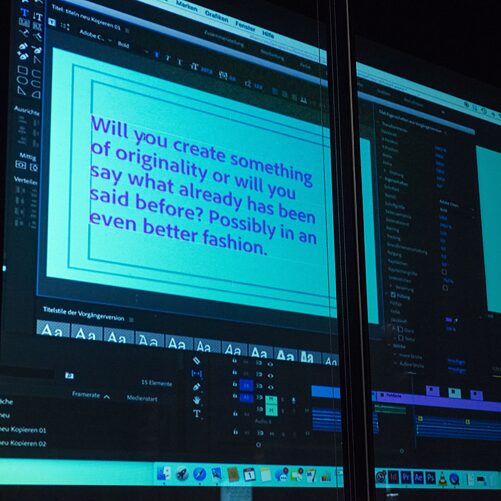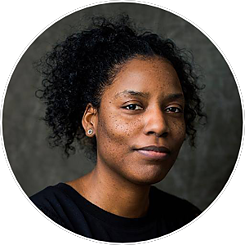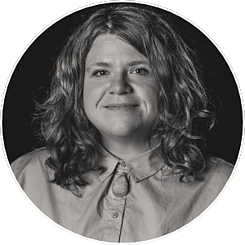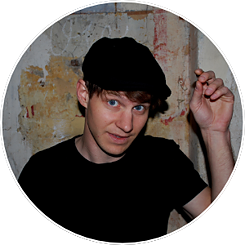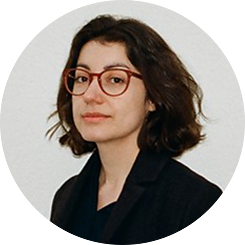(Large) cities after COVID-19
The city during or after Covid-19 – this evokes the longings of urban utopians for green, car-free inner cities, wide sidewalks if not entire streets just for strolling, sweeping bicycle lanes, and parking lots turned into plazas. Meanwhile, the most densely populated inner cities have once again been hit the hardest during this crisis. We remember the dystopian scenarios of deserted downtowns, empty streets, rows of boarded-up stores, and a cultural life that was virtually frozen in place. In the midst of all this, mobile testing centres on public parking lots, and parking garages and parks converted into makeshift hospitals.
Our call was directed at artists from Germany and Canada. The submitted video works dealt with the following questions: What is life like in the (large) cities during a pandemic? How do social rules and medical hygiene regulations affect our bodies? How do we move in urban space? How do we interact and communicate with each other in times of social distancing? And above all, how do we still bear it at home?
The works look at uncertain - perhaps very deserted - futures, but also focus on the fact that in some parts of the world - in conflict and war zones and in unfree societies - confinement is a sad reality even without a pandemic.
From the numerous submissions, our jury of experts has selected eight works from Canada and Germany, each of which will be presented for two weeks, between October 2020 and March 2021 after dark, onto screens placed in the store-front windows of the Goethe-Institut Montreal on Boulevard St. Laurent.
The artists and their works
From October 15 to October 31, 2020
HOUSEBOUND
Video, 4:46 mins | Germany, 2020
Director: Jens Pecho
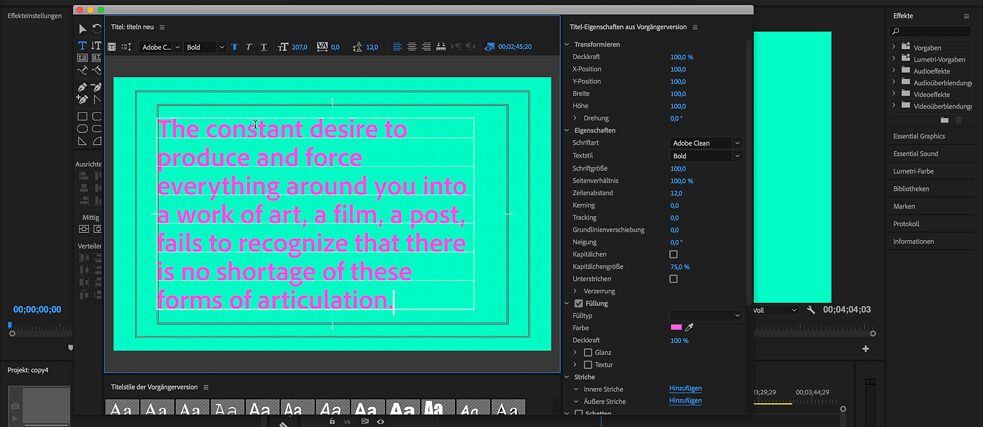 © Jens Pecho
Housebound is a commissioned work for this years’ edition of the International Short Film Festival Oberhausen. It is my contribution to the festival's discussion: "Can and should one make films now?" The short found-footage film reflects on the impact social status has on our individual capabilities to deal with the current restrictions. It also is a critique on the art worlds immediate urge to transform the crisis itself into artistic production.
© Jens Pecho
Housebound is a commissioned work for this years’ edition of the International Short Film Festival Oberhausen. It is my contribution to the festival's discussion: "Can and should one make films now?" The short found-footage film reflects on the impact social status has on our individual capabilities to deal with the current restrictions. It also is a critique on the art worlds immediate urge to transform the crisis itself into artistic production. Jury Statement
With the impromptu call “Can and should one make films now?”, this year's Oberhausen International Shortfilm Festival invited a number of video artists to submit their statement in the form of a short video work. Out of this context, Housebound critically reflects the effects of the pandemic and such calls on art production. Produced as a screen-video, the work pointedly displays that in times of contact restrictions computerscreens and the Internet become the primary medium of perception, production and discussion of art, and take on the role of a “window to the world” more than ever. (Anna Lena Seiser)
About Jens Pecho
Jens Pecho studied at the Academy of Media Arts Cologne as well as the Staatliche Hochschule für Bildende Künste – Städelschule in Frankfurt am Main. As a visual artist, he works mostly with text- and video-based installations. His works have been shown internationally at museums as well as film festivals, among them the Art and Exhibition Hall of the Federal Republic of Germany, the Forum d'Art Contemporain – Casino Luxembourg, the Herzliya Museum of Contemporary Art, Israel, the International Short Film Festival Oberhausen, Germany, the Message to Man IFF Saint Petersburg, Russian Federation, and the Uppsala International Short Film Festival, Sweden.
Jardins paradise
Video, 4:46 min. | Canada, 2020
Director: Yza Laure Nouiga
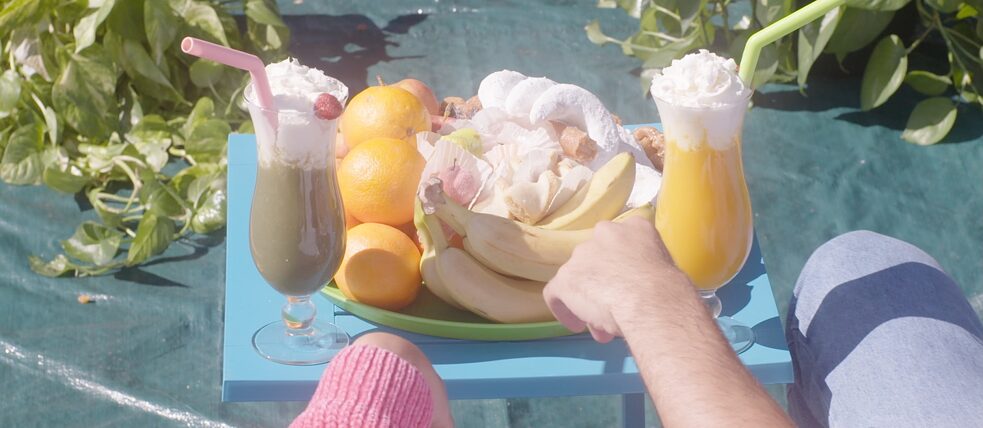 © Yza Nouiga
Garden of Eden, jardin à la française, English, Zen, Bahai, Arab-Islamic: Gardens reflect history, culture and heritage. They are some of the rare places where intimacy, gatherings, fun and religion coexist. Jardins Paradise ironically diverts the image of the garden as the embodiment of some paradisiacal Eden. It highlights the civic inventiveness of communities stigmatized by a lack of greenery in their neighborhood as well as the contribution of ethnocultural diversity to the urban landscape.
© Yza Nouiga
Garden of Eden, jardin à la française, English, Zen, Bahai, Arab-Islamic: Gardens reflect history, culture and heritage. They are some of the rare places where intimacy, gatherings, fun and religion coexist. Jardins Paradise ironically diverts the image of the garden as the embodiment of some paradisiacal Eden. It highlights the civic inventiveness of communities stigmatized by a lack of greenery in their neighborhood as well as the contribution of ethnocultural diversity to the urban landscape.The film imagines young members of the Arab diaspora in Montreal using the means at hand to develop a secular and democratic version of the Arab-Islamic style garden. A parking lot, an arid zone much like the deserts where these gardens originally emerged, has been rehabilitated into an ephemeral garden. In being faithful to the main components of the Arab-Islamic style, the water source is the centerpiece, squares of plants occupy the parking spaces, as well as flowers and fruits, and contemplation is the main activity. Nature is presented artificially, as it is only a momentary paradise, that of individual leisure.
And, what if Paradise was nothing more than a green parking lot designed to suit each and everyone's own preferences?
jury statement
Yza Laure Nouiga’s Jardins Paradise, works through a surreal but also not so surreal narrative where beach umbrellas, grass tiles and a kiddy pool have created a space of leisure in a parking lot no-longer used. A moment of relaxation on a beach or access to fields of grass aren't so easily come by for a city-dweller due to the pandemic’s many ramifications. This complex film poses many questions, one of which perhaps asks us: how can we re-organize our concrete gardens with people in mind? (Anyse Ducharme)
about yza laure nouiga
Yza Nouiga is a French Moroccan emerging director, and screenwriter based in Montreal. Born and raised in Morocco, she's been living in Canada for the last 10 years. She has just received the SODEC’s "Programme d’aide à la création émergente" for a first feature-lenght film, Circo, that she is cowriting with Lamia Chraibi. She is also currently working on a short feature, L’Oasis, on the themes of identities, dual nationality and homecoming.
imperial valley (cultivated run-off)
Video, 13:58 min. | Germany, 2020
Director: Lukas Marxt
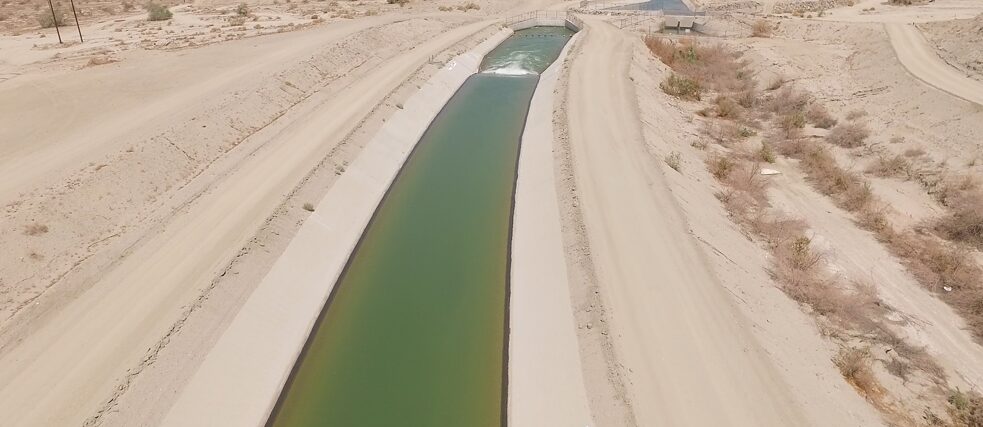 © Lukas Marxt
The Imperial Valley represents one of California´s most important regions of industrial agriculture. Corporate agricultural production interests have been able to successfully cultivate and exploit this geological part of the Sonora desert through a gigantic irrigation system fed by the Colorado River, as well as the All-American Canal specifically engineered for this purpose and which attained sad notoriety through the Mexican migration movement. The system´s run-off flows through pipes, pumps and canals leading to the Salton Sea, an artificial lake that is approaching ecological as well as economic disaster, just as bordering regions of Mexico.
© Lukas Marxt
The Imperial Valley represents one of California´s most important regions of industrial agriculture. Corporate agricultural production interests have been able to successfully cultivate and exploit this geological part of the Sonora desert through a gigantic irrigation system fed by the Colorado River, as well as the All-American Canal specifically engineered for this purpose and which attained sad notoriety through the Mexican migration movement. The system´s run-off flows through pipes, pumps and canals leading to the Salton Sea, an artificial lake that is approaching ecological as well as economic disaster, just as bordering regions of Mexico.With Imperial Valley (cultivated run-off) Lukas Marxt approaches this problem in a very ingenious way. He begins with a bird´s eye view of an irrigation canal coursing through a desert landscape. A drone camera flies the length of the canal, subsequently flying over Imperial Valley landscapes from the same perspective. Initially appearing as nothing more than spectacular documents of agricultural monocultures, the shots become increasingly abstract – additionally heightened through the accompaniment of an electronic score. Is this an actual or artificially simulated landscape? This ambiguity is precisely the point: The Imperial Valley is becoming the "Uncanny Valley", a place that is not yet or no longer natural and thereby appears eerie. A landscape post landscape (or its medial representation) is a geometric concept of lines, surfaces, points and color spots, regardless whether of an animate or lifeless nature. Although manmade, it is not a place for people anymore, neither ontologically nor in reality. The post-apocalypse is not a matter of the future, we are already in the thick of it. (Claudia Slanar)
jury statement
A film of great mastery that offers a glimpse into the future as the industrial world collapses. After all the excesses, what will remain of our cities? (Miryam Charles)
about lukas marxt
Lukas Marxt is an artist and filmmaker living and working between Cologne and Graz. Marxt’s interest in the dialogue between human and geological existence, and the impact of man upon nature was first explored in his studies of Geography and Environmental Science at the University of Graz, and was further developed through his audio visual studies at the Art University in Linz. He received his MFA from the Academy of Media Arts Cologne, and attended the postgraduate programme at the Academy of Fine Arts Leipzig.
Marxt has shared his research in the visual art and cinema contexts. His works have been featured in numerous solo and group exhibitions, most recently at the Hamburger Bahnhof – Museum for Contemporary Art (Berlin, 2019), at Landesgalerie Niederösterreich, (Krems 2019), at the Torrance Art Museum (Los Angeles, 2018), The Biennial of Painting, Museum Dhondt-Dhaenens (Belgium, 2018), and the Museum of Modern and Contemporary Art Rijeka (Croatia, 2018). His films have been presented in numerous international film festivals including Locarno Film Festival (Swiss, 2019), Viennale (Austria, 2019), Berlinale (Germany, 2017 and 2018), Curtas Vila do Conde (Portugal, 2018), and the Gijón International Film Festival, where he received the Principado de Asturias prize for the best short film (Spain, 2018). Since 2017, Marxt has spent a considerable amount of time in Southern California, where he has researched the ecological and socio-political structures surrounding the Salton Sea.
statuo quo
Video, 10:00 min. | Canada, 2020
Directors: Lamia Chraibi and Marion Chuniaud-Lacau
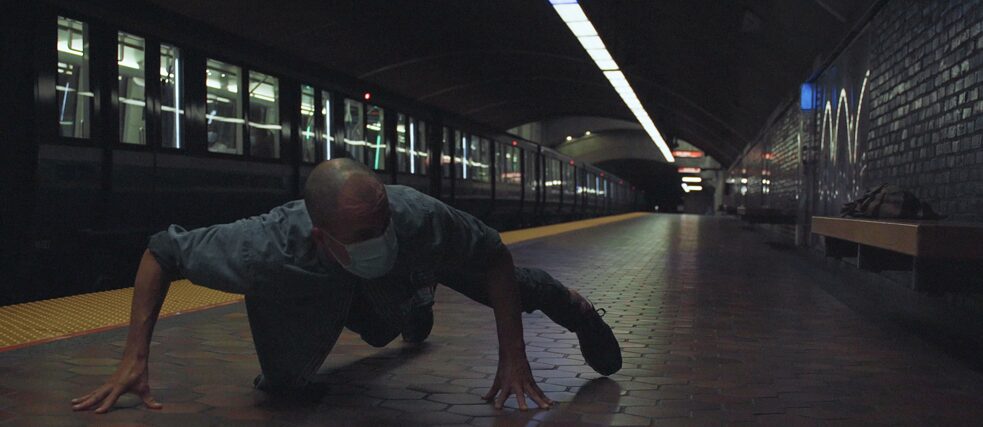 © Lamia Chraibi, Marion Chuniaud-Lacau
In a world on hold, a common story is being written. Without sight, without touch, bodies move to the rhythm of solitude. Locked in their existence, they have become impatient and entwined. They roll and they stretch. In the dawn of madness, they are breaking the status quo. In a creative impulse, they, together, stand up and transport us to the abandonment of thoughts. However, deep down inside, they will know one day this will only be memories. Memory is fiction. It has no name or color. And often faced with vertigo, we end up forgetting all. Only our bodies will continue to vibrate. This is why we must step out and dance.
© Lamia Chraibi, Marion Chuniaud-Lacau
In a world on hold, a common story is being written. Without sight, without touch, bodies move to the rhythm of solitude. Locked in their existence, they have become impatient and entwined. They roll and they stretch. In the dawn of madness, they are breaking the status quo. In a creative impulse, they, together, stand up and transport us to the abandonment of thoughts. However, deep down inside, they will know one day this will only be memories. Memory is fiction. It has no name or color. And often faced with vertigo, we end up forgetting all. Only our bodies will continue to vibrate. This is why we must step out and dance.STATU QUO is an experimental short film created thanks to the exceptional participation of ten Montreal dancers who have performed, in front of Chraibi and Chuniauds’ cameras, for the very first time since the Covid-19 pandemic. In the streets of Montreal, they have improvised a dance, alone or together. Without choreography or stage direction, they have expressed through their bodies and eyes what we have been experiencing for months and what the future holds. Chraibi and Chuniaud have captured their movements, sometimes inspiring the anguish of isolation or the joy of reunion. This film is a testimony of the bonds that unites them and the common story written by their bodies.
jury statement
This film depicts a bewitching dance between life and death where the past, the present and the future come together to create an ode to hope. (Miryam Charles)
about the directors
Born in France and raised in Morocco, Lamia Chraibi has at a very young age been submerged in multicultural environments. After studying Political Science at the Sorbonne university in Paris, she has travelled to Latin America in search of a variety of stories which all have in common the same hidden and secretive struggle. Her first award-winning documentary Amazon Voices is an important documentary on the struggle of Indigenous communities against oil exploitation. Having then immigrated to Montreal in 2015, she studied documentary film at INIS (National Institute of Image and Sound). Since then, she has dedicated her body of work and life in hope of giving voice to the unknown social actors through the art of cinema.
Marion Chuniaud has a master’s degree in international and intercultural communication. Passionate about art and human relations, she is interested in gender, political and cultural issues and the processes of social transformation for a more just and inclusive society. Very quickly, she applied her sensitivity and her artistic sense to her reflections, particularly through photography and video. After a first short film in Colombia, she decided to perfect her documentary knowledge at the National Institute of Sound and Image of Montreal (INIS) in the fall of 2020.
why or why not?
Video, 6:46 min. | Germany, 2020
Director: Kerstin Honeit
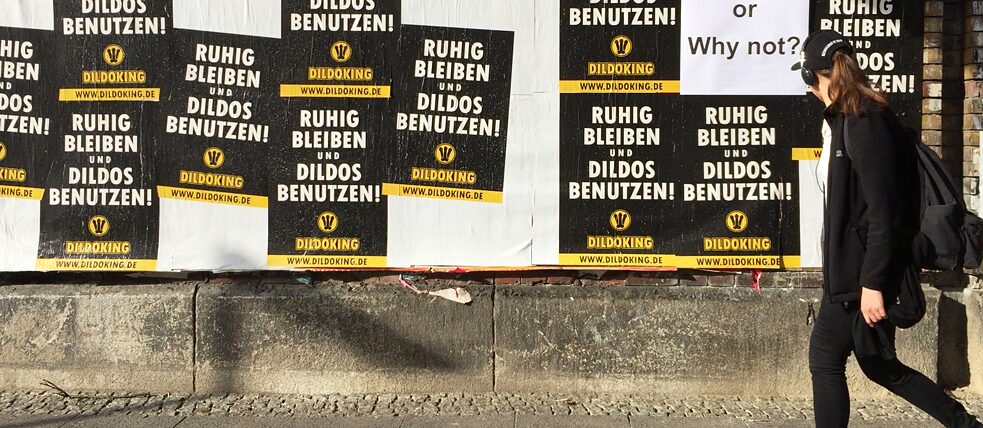 © Kerstin Honeit
The work Why or Why not? was commissioned by the International Short Film Festival Oberhausen. Lars Henrik Gass, the festival director, asked filmmakers during the lockdown in Germany to make a video contribution to negotiate the question: Can and should one make films now?
© Kerstin Honeit
The work Why or Why not? was commissioned by the International Short Film Festival Oberhausen. Lars Henrik Gass, the festival director, asked filmmakers during the lockdown in Germany to make a video contribution to negotiate the question: Can and should one make films now?The challenge of producing a film without a crew in front of or behind the camera was less interesting to Honeit than examining the massive shift in perspective of one's own actions in the face of a worldwide pandemic. That is why she reduced the question to Why or Why not?, which is less about the possibilities or impossibilities of continuing an (artistic) practice in a lockdown, but more about questioning in general a continuation of life 'as before' in the age of the Capitalocene.
The camera, which was set up in the streets of Berlin during the first lockdown in March 2020, frames several tableaux vivants of the new Corona everyday life, commenting via analogue text panels that are held into the picture. Two opposing narratives are presented in uncanny familiarity.
jury statement
In pandemic times the "new normal" shouts at society. Kerstin Honeit analyzes the imperatives of (post) Covid-19 logics by deconstructing the new reality through a (self)reflective work. A Filmmakers point of view which shows the ambiguity of daily affirmations that affect artistic creation (or not). (Peter Haueis)
about kerstin honeit
Kerstin Honeit studied fine arts and stage design at the Berlin-Weissensee Art Academy. She lives in Berlin and has been teaching media art at the Academy of Visual Arts in Leipzig since this winter semester. Previously, she was an artistic co-teacher working together with Bjørn Melhus at the Kunsthochschule Kassel, where she researched the voice as a queer event within moving images.
In her practice as an artist and filmmaker, she works at the interface of different forms of staging. Her artistic research focuses on the investigation of representation mechanisms in the production of hegemonic image worlds, especially in connection with cultural and linguistic modes of translation in the context of the moving image. Since 2006 she has been showing her work in exhibitions and at festivals.
{null}
Video, 10:41 min. | Canada, 2020
Director: Andrée-Anne Roussel
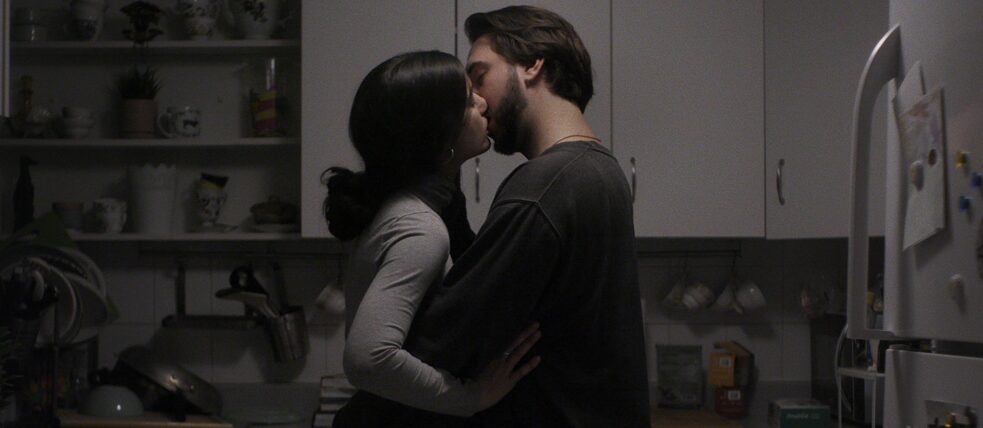 © Andrée-Anne Roussel
A performance artist, a sleeping man, a couple kissing... {null} is a contemplative short film on the border between documentary and fiction, composed of ten fixed tableaux. An impressionist portrait in which we observe individuals in search of meaning and real connections.
© Andrée-Anne Roussel
A performance artist, a sleeping man, a couple kissing... {null} is a contemplative short film on the border between documentary and fiction, composed of ten fixed tableaux. An impressionist portrait in which we observe individuals in search of meaning and real connections.jury statement
Andrée-Anne Roussel's {null} captures the tristesse of a post-pandemic life with a candid beauty. As observers, we become immersed in reflections of the familiar within an alien context, underlined by a superb soundscape. (Annette Hegel)
about andrée-anne roussel
Andrée-Anne Roussel is both a filmmaker and new media artist. She holds a Bachelor's degree in film production and a Masters in Communications (concentration in research-creation of experimental media) from l’Université du Québec à Montréal. Her interactive video installations and sensory short films are the result of her research on themes of ambiguity, fragility, empathy and spirituality. Her work has been shown at the Sapporo International Short Film Festival, the Musée d’art de Joliette and at LABoral Centre de Arte
documentation report (no. 0617 - 0918)
Video, 4:50 min. | Germany, 2017-2019
Director: Beatrice Schuett Moumdjian
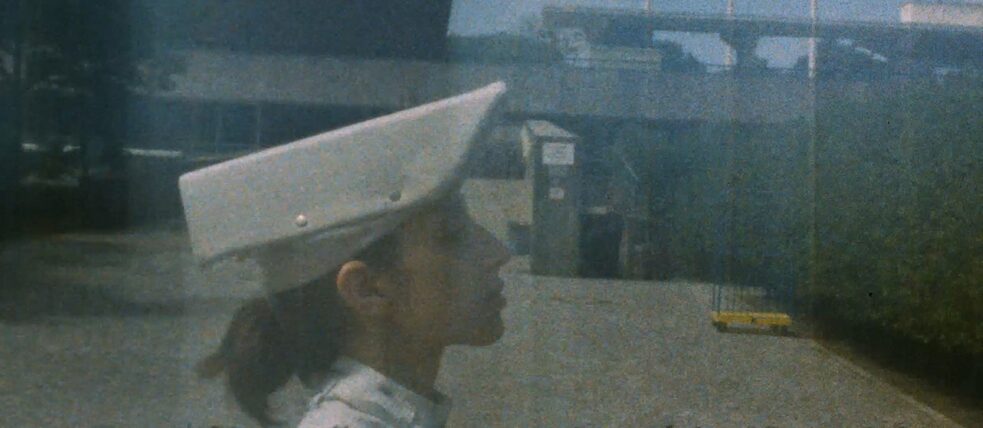 © Beatrice Moumdjian
Documentation Report (No. 0617 - 0918)
© Beatrice Moumdjian
Documentation Report (No. 0617 - 0918)Documentation Report is a continuous series of short episode like film sequences. The protagonist is a woman, whose head resembles a surveillance camera. Through this prosthesis she becomes a surveying entity herself. In the different episodes she is observed as she walks through nearly empty streets in formerly communist cities and looks at surveillance cameras and is looked at by them. Often these cameras are located in the vicinity of buildings that are of importance in society, for example the federal intelligence agency in Berlin or the National Cultural Palace in Sofia.
The filmmaker has personal connections to all places, where she and her cinematographer Lars Preisser have filmed. For instance, she was born before the fall of the Berlin wall in Sofia during the socialist regime, and has now many years later filmed/observed in the same street, where she once has lived.
Her family, like many people during socialism, has been affected by state surveillance, which is a detail she only knows little about.
jury statement
Documentation, Observation, Surveillance. Monitoring public spaces, buildings, people. Beatrice Moumdjian visits empty urban spaces where cameras are looking into the void that is left behind the people that are in lockdown. What are they looking at, when everybody is at home? (Peter Haueis)
about beatrice schuett moumdjian
*1986 in Sofia, People's Republic of Bulgaria to Armenian family, 1990 emigration to Berlin, Germany.Education 2013 – 2020 at the art academies in The Hague (NL), Weimar and Leipzig (DE). M.F.A. in Media Art and Photography in 2020 at the Academy of Fine Arts Leipzig. Beatrice’s recent exhibition participations include Gegenwarten/Presences in Chemnitz and Art in the Underground at nGbK Berlin. Her project „International Bun“ was shortlisted in 2020 in the competition Kunst im Stadtraum – Karl Marx Allee by the Berlin Senate. Screenings internationally, e.g. LUFF in 2019 and Kassel Documentary Film and Video Festival in 2018.
confinement.lands
Video, 14:55 min. | Canada, 2020
Director: Cinzia Campolese
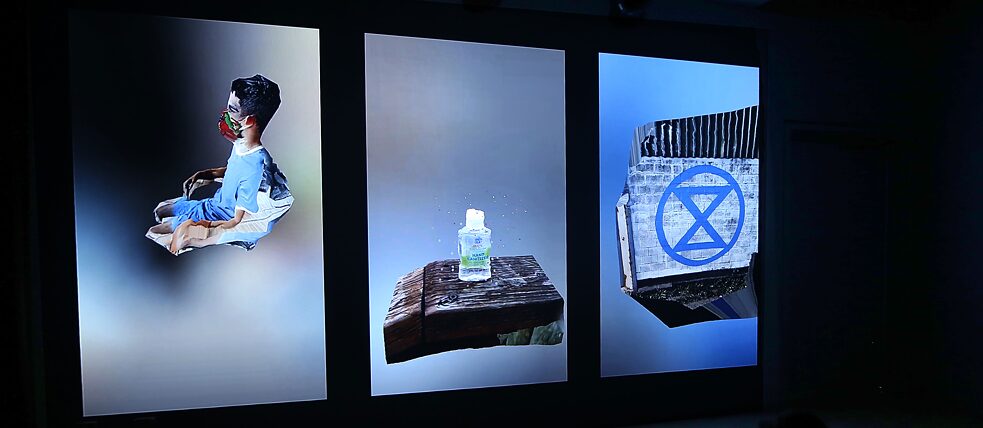 © Cinzia Campolese
Confinement.lands is a project started during the confinement period. It consists of a corpus of works, one of which is a video triptych piece created using recordings of photogrammetries taken during the confinement period from a web platform (Display land), that depict confinement houses, places and people all over the world. The piece aims to propose an outlook towards the reappropriation of intimate spaces and the disappearance of the role of urbanism, replacing it fully with a virtual one. The shutdown of a big part of our capitalistic machine has created an empty meaning in our constructed public spaces, neighbourhoods, streets and playgrounds, and has put the focus on the important concepts of our already damaged social structure: from the notion of time and hysterical mass consumption and production to the ultimate expansion of our social-economical inequalities.
© Cinzia Campolese
Confinement.lands is a project started during the confinement period. It consists of a corpus of works, one of which is a video triptych piece created using recordings of photogrammetries taken during the confinement period from a web platform (Display land), that depict confinement houses, places and people all over the world. The piece aims to propose an outlook towards the reappropriation of intimate spaces and the disappearance of the role of urbanism, replacing it fully with a virtual one. The shutdown of a big part of our capitalistic machine has created an empty meaning in our constructed public spaces, neighbourhoods, streets and playgrounds, and has put the focus on the important concepts of our already damaged social structure: from the notion of time and hysterical mass consumption and production to the ultimate expansion of our social-economical inequalities.jury statement
Confinement.Lands is a striking journey around the world reconfigured by the pandemic. The photogrammetries that people of all ages and on every continent have made available are as bizarre as they are touching, as astonishing as they are intimate. The way Cinzia Campolese compiled the extremely diverse range of spaces and situations in which people around the world experience the confinement creates a fascinating cartography and ultimately even a new sense of community within the isolation. (Anna Lena Seiser)
about cinzia campolese
Cinzia Campolese is an artist who lives and works in Montreal. Her work includes the creation of audio-visual environments and generative pieces that question the concepts of perception and awareness of a space. Working on different scales, she questions the ubiquity of certain visual elements that are part of our cultural genetics. Her artworks were exhibited at cultural institutes, galleries and in cultural events such as Stereolux, B39 space, Centre Wallonie-Bruxelles, Biennale Chroniques, Biennale Nova XX and Mutek Montreal.
In her recent bodies of works, Campolese has been working on the creation of interactive pieces and light sculptures, like “Error” and “Frame of Reference”, for which she received the Art Collector prize in November 2019. Her projects were featured on The Creators Project (Vice), L'Œil, Juliet Art Magazine, Archdaily, Fubiz and she was included in the 2019 Exibart book 222 emerging artists worth investing in.
The Jury
Miryam Charles is a Montreal based Canadian filmmaker. She studied cinema at Concordia University and has worked as a director, producer, writer, and cinematographer. Her short films include Fly, Fly Sadness (2015), Towards the Colonies (2016), A Fortress (2018), and Three Atlas (2018). Her works have been screened at various film festivals around the world. Her latest short film Second Generation (2019) was presented at TIFF. A retrospective of her work was presented at the Cinémathèque québécoise (2019). In 2020, a second retrospective was presented during the fourth edition of the Third Horizon Film Festival in addition to an installation at the Leonard and Ellen Bina Gallery in Montreal. She is currently working on her first documentary feature, which has been awarded a grant from the Talents to watch program (Telefilm Canada).
Anyse Ducharme is a franco-ontarian media artist from northeastern Ontario. Her artistic practice is engaged with the circulation of digital imagery and the malleability of data. She has exhibited in Sudbury, Ottawa, Toronto, Vancouver, Winnipeg, Middlesbrough, Boston and New York. Ducharme works as the Artistic Programmer at Knot Project Space — SAW Video Media Art Centre (Ottawa), and sits on the board of directors of both La Galerie du Nouvel-Ontario and the Media Art Network of Ontario. She holds an MFA from the University of British Columbia (Vancouver), a BFA from the University of Ottawa, and a college diploma in 3D Animation from La Cité collégiale (Ottawa).
Peter Haueis is a filmmaker and curator based in Hamburg. He studied in Weimar, Lyon and Hamburg. In addition to his work as a director and his work for the Hamburg Short Film Festival, he has been a permanent member of the artists' group A Wall is a Screen for 10 years. The work of the collective focuses on contextualizing short film, architecture and social spaces. As a mobile short film cinema, A Wall is a Screen intervenes in public space worldwide and uses urban structures as screens. In doing so, they repeatedly propose changes in perspective by placing the reception of short films and media art in a new context. In the process, socio-political, urban and social issues are often problematized.
Annette Hegel is a working multi-media artist who has exhibited her work in Canada and in Europe. Working out of her studio in downtown Ottawa, she is a founding member of Slipstream Collective, and collaborating with many artists across the city. She also has had a 30 year career in cultural marketing and communications, developing identities and successfully establishing brands in both the for profit and not for profit sectors. Before joining the SAW Video team, she produced and led implementation of targeted marketing and communication strategies for national organizations and international brands. She is a recipient of many awards, among them cultural brand of the year award.
Anna Lena Seiser is a media and cultural scientist and head of Video-Forum at Neuer Berliner Kunstverein (n.b.k.). She previously worked as a curator at Kunsthalle Düsseldorf, where she has realized extensive solo and group exhibitions during recent years, including Fire on the Mountain with Megan Rooney, 2019, Simon Fujiwara: Figures in a Landscape, 2016/2017, and, co-curated with Jasmina Merz, Welcome to the Jungle, 2018, with Jonathas de Andrade, Kristina Buch, Laura Lima, Liu Shiuyan, Alvaro Urbano, a.o. From 2011–2015 Seiser worked for the German Academic Scholarship Foundation as well as for the postgraduate Karl Schmidt-Rottluff Scholarship program. In 2009/2010 she was part of the program team of transmediale - festival for arts and digital culture in Berlin. Seiser researched and published on the media history of the living image at the intersection of art and science. Her curatorial interest lies in experimental exhibition formats with a focus on site specific productions, performance and time-based media.
